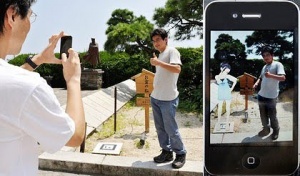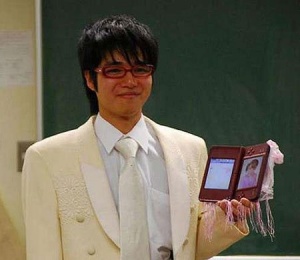Difference between revisions of "Love Plus"
(added additional info and source) |
(expanded on first section) |
||
| Line 2: | Line 2: | ||
<h1> Love Plus </h1> | <h1> Love Plus </h1> | ||
| − | Love Plus is a bishōjo (beautiful girl), or "dating simulator", type game of the Erogẽ (erotic game) video game genre <ref> Bishōjo Games: ‘Techno-Intimacy’ and the Virtually Human in Japan, May 2011, http://gamestudies.org/1102/articles/galbraith </ref>. Dating simulators were developed in Japan to encourage young men into starting relationships, but seem to contribute to the overall birth-rate decline. Love Plus was developed and released by Konami in Japan for the portable Nintendo DS game console | + | Love Plus is a bishōjo (beautiful girl), or "dating simulator", type game of the Erogẽ (erotic game) video game genre <ref> Bishōjo Games: ‘Techno-Intimacy’ and the Virtually Human in Japan, May 2011, http://gamestudies.org/1102/articles/galbraith </ref>. Dating simulators were developed in Japan to encourage young men into starting relationships, but seem to contribute to the overall birth-rate decline. Love Plus was developed and released by Konami in Japan for the portable Nintendo DS game console on September 3, 2009. An expanded version of Love Plus with additional content and features was released as LovePlus+ in Japan on June 24, 2010. Additionally an IOS app version called LovePlus I was released on December 12, 2011.<ref>[https://www.konami.com/games/jp/ja/]</ref> |
<br> | <br> | ||
Revision as of 01:38, 9 April 2021
Contents
Love Plus
Love Plus is a bishōjo (beautiful girl), or "dating simulator", type game of the Erogẽ (erotic game) video game genre [1]. Dating simulators were developed in Japan to encourage young men into starting relationships, but seem to contribute to the overall birth-rate decline. Love Plus was developed and released by Konami in Japan for the portable Nintendo DS game console on September 3, 2009. An expanded version of Love Plus with additional content and features was released as LovePlus+ in Japan on June 24, 2010. Additionally an IOS app version called LovePlus I was released on December 12, 2011.[2]
Dating Simulators
The Dating Simulator Bias
The most common type of dating simulation game involves a protagonist, usually teenage, attempting to establish a relationship with one of several potential partners. Dialogue choices determine the course of the game, with appropriate dialogue selections earning "love" points or stats. The ultimate goal is to either establish the relationship, marriage, a confession of love, or intercourse with the desired character. Incorrect dialogue choices result in losing the interest of the potential partner, ending the game. Game replay value comes in the form of pursing a different character, or achieving different outcomes. Game production is kept relatively simple by utilizing static animations, recycled backgrounds, and text instead of voice.
Erogẽ games are predominately focused toward males. Over 400 brands exist, creating gaming content exclusively designed for the heterosexual male gamer. Arguments have been made in support that Erogẽ games are designed to encourage or fortify 'masculine' traits, sometimes even by violent means [3]. Love Plus added a facial recognition feature to unlock and resume the game called "Boyfriend Lock". A smaller movement has emerged to cater to a more diverse audience, and are usually available only as mobile apps.
Privacy
While face and voice recognition [4] is adopted for the game no evidence of recording or information sharing has been found.
"Techno-Intimacy"
"Techno-Intimacy" is a term coined by Duke University Professor and Chair of Cultural Anthropology Anne Allison in her book "Millennial Monsters". It involves interacting and forming an intimate bond with a product that is both a physical machine and a virtual entity. It is generally linked with human disassociation, and lack of communication skills.[5]
The virtual girlfriend
The premise of Love Plus is to court one of three characters in the game [6]. Unlike most reward-based games (collecting items, defeating enemies, powering-up weapons, etc.), the object is to have the chosen character proclaim her love for you, and initiate dating. The game endures after this ultimate goal by continuing to 'date' the virtual girlfriend. Players of Love Plus have taken the objective literally, [7] and began exclusively dating their virtual girlfriend. Players will travel to actual destinations (beaches, aquariums, events, etc) to coincide with dates performed in the game. One man decided to ultimately marry [8] his virtual girlfriend.
The current legality of marrying a virtual character is uncertain, but it also questions what a relationship can actually mean. The progressive meshing of humans and artificial intelligence, as Luciano Floridi describes a human-technology-technology scheme in his book "The 4th Revolution",[9] can bring about numerous possibilities, and emotional relationships with machines may be one of them. This may not seem taboo in the context of people doing whatever brings them happiness so long as it's not harming or affecting other people. It may however contribute to the population concern of Japan, where the game is most popular. Japan's population growth has been in decline since 1978, and as of 2011 has been in negative growth according to The World Bank.
References
- ↑ Bishōjo Games: ‘Techno-Intimacy’ and the Virtually Human in Japan, May 2011, http://gamestudies.org/1102/articles/galbraith
- ↑ [1]
- ↑ Bishōjo Games: ‘Techno-Intimacy’ and the Virtually Human in Japan, May 2011, http://gamestudies.org/1102/articles/galbraith
- ↑ Nintendo 3DS dating sim has facial recognition, December 2010, https://www.techradar.com/news/gaming/nintendo-3ds-dating-sim-has-facial-recognition-918245
- ↑ Techno-Intimacy in Japan, June 28, 2014, https://japansociology.com/2014/06/28/techno-intimacy-in-japan/
- ↑ Meet the Lonely Japanese Men in Love With Virtual Girlfriends, September 15, 2015, https://time.com/3998563/virtual-love-japan/
- ↑ The Japanese Gamers Who Prefer to Date Videogame Characters, October 28, 2015, https://www.wired.com/2015/10/loulou-daki-playing-for-love/
- ↑ SAL 9000 and Nene Anegasaki, December 21, 2009, https://knowyourmeme.com/memes/events/sal9000-nene-anegasaki
- ↑ "The 4th Revolution, 2014, http://governance40.com/wp-content/uploads/2018/12/Luciano-Floridi-The-Fourth-Revolution_-How-the-infosphere-is-reshaping-human-reality-2014-Oxford-University-Press.pdf


